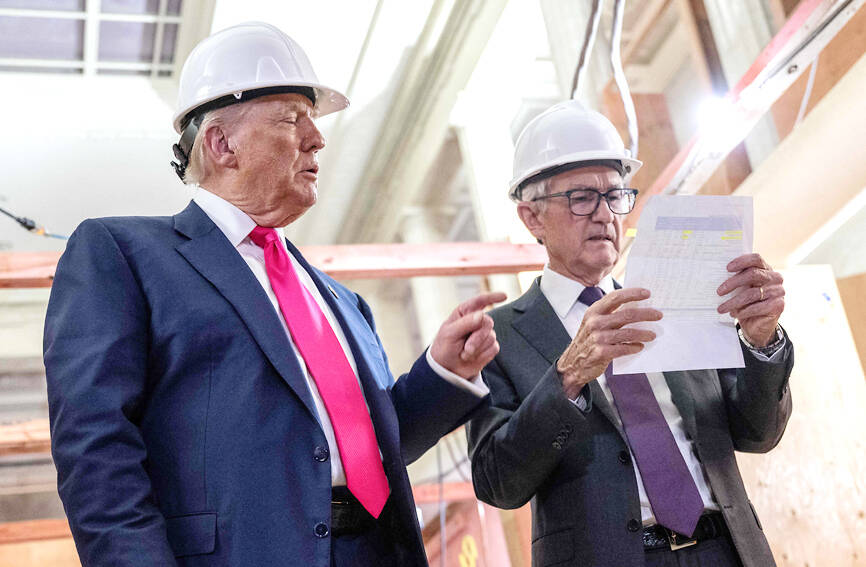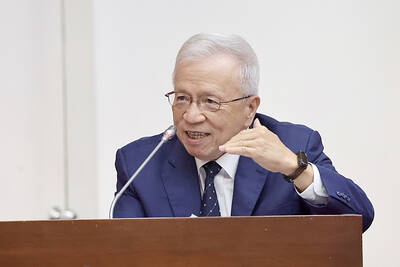The US central bank is widely expected to hold off slashing interest rates again at its upcoming meeting, as officials gather under the cloud of an intensifying pressure campaign by US President Donald Trump.
Policymakers at the independent US Federal Reserve have kept the benchmark lending rate steady since the start of the year as they monitor how Trump’s sweeping tariffs are impacting the world’s biggest economy.
With Trump’s on-again, off-again tariff approach — and the levies’ lagged effects on inflation — Fed officials want to see economic data from this summer to gauge how prices are being affected.

Photo: AFP
When mulling changes to interest rates, the central bank — which meets tomorrow and Wednesday — seeks a balance between reining in inflation and the health of the jobs market.
However, the bank’s data-dependent approach has enraged the Republican president, who has repeatedly criticized Fed Chair Jerome Powell for not slashing rates further, calling him a “numbskull” and “moron.”
Most recently, Trump signaled he could use the Fed’s US$2.5 billion renovation project as an avenue to oust Powell, before backing off and saying that would be unlikely.
Trump visited the Fed construction site on Thursday last week, making a tense appearance with Powell in which the Fed chair disputed Trump’s characterization of the total cost of the refurbishment in front of the cameras.
Economists expect the Fed to look past the political pressure at its policy meeting.
“We’re just now beginning to see the evidence of tariffs’ impact on inflation,” Oxford Economics chief US economist Ryan Sweet said.
“We’re going to see it [too] in July and August, and we think that’s going to give the Fed reason to remain on the sidelines,” he said.
The Fed’s benchmark lending rate stands at a range between 4.25 percent and 4.50 percent.
Trump argues that lower rates would save the government money on interest payments, and floated the idea of firing Powell. The comments roiled financial markets.
“Powell can see that the administration floated this trial balloon” of ousting him before walking it back on the market’s reaction, Sweet said.
“It showed that markets value an independent central bank,” he added, anticipating Powell would instead be more influenced by labor market concerns.
Powell’s term as Fed chair ends in May next year.
Analysts expect to see a couple of members break ranks if the Fed’s rate-setting committee decides for a fifth straight meeting to keep interest rates unchanged.
Fed Governor Christopher Waller and Vice Chair for Supervision Michelle Bowman have both signaled openness to rate cuts early this month, meaning their disagreement with a decision to hold rates steady would not surprise markets.
However, too many dissents could be “eyebrow-raising,” and lead some to question if Powell is losing control of the board, Nationwide chief economist Kathy Bostjancic said, but added: “I don’t anticipate that to be the case.”

JITTERS: Nexperia has a 20 percent market share for chips powering simpler features such as window controls, and changing supply chains could take years European carmakers are looking into ways to scratch components made with parts from China, spooked by deepening geopolitical spats playing out through chipmaker Nexperia BV and Beijing’s export controls on rare earths. To protect operations from trade ructions, several automakers are pushing major suppliers to find permanent alternatives to Chinese semiconductors, people familiar with the matter said. The industry is considering broader changes to its supply chain to adapt to shifting geopolitics, Europe’s main suppliers lobby CLEPA head Matthias Zink said. “We had some indications already — questions like: ‘How can you supply me without this dependency on China?’” Zink, who also

At least US$50 million for the freedom of an Emirati sheikh: That is the king’s ransom paid two weeks ago to militants linked to al-Qaeda who are pushing to topple the Malian government and impose Islamic law. Alongside a crippling fuel blockade, the Group for the Support of Islam and Muslims (JNIM) has made kidnapping wealthy foreigners for a ransom a pillar of its strategy of “economic jihad.” Its goal: Oust the junta, which has struggled to contain Mali’s decade-long insurgency since taking power following back-to-back coups in 2020 and 2021, by scaring away investors and paralyzing the west African country’s economy.

BUST FEARS: While a KMT legislator asked if an AI bubble could affect Taiwan, the DGBAS minister said the sector appears on track to continue growing The local property market has cooled down moderately following a series of credit control measures designed to contain speculation, the central bank said yesterday, while remaining tight-lipped about potential rule relaxations. Lawmakers in a meeting of the legislature’s Finance Committee voiced concerns to central bank officials that the credit control measures have adversely affected the government’s tax income and small and medium-sized property developers, with limited positive effects. Housing prices have been climbing since 2016, even when the central bank imposed its first set of control measures in 2020, Chinese Nationalist Party (KMT) Legislator Lo Ting-wei (羅廷瑋) said. “Since the second half of

Taiwan Semiconductor Manufacturing Co (TSMC, 台積電) received about NT$147 billion (US$4.71 billion) in subsidies from the US, Japanese, German and Chinese governments over the past two years for its global expansion. Financial data compiled by the world’s largest contract chipmaker showed the company secured NT$4.77 billion in subsidies from the governments in the third quarter, bringing the total for the first three quarters of the year to about NT$71.9 billion. Along with the NT$75.16 billion in financial aid TSMC received last year, the chipmaker obtained NT$147 billion in subsidies in almost two years, the data showed. The subsidies received by its subsidiaries —